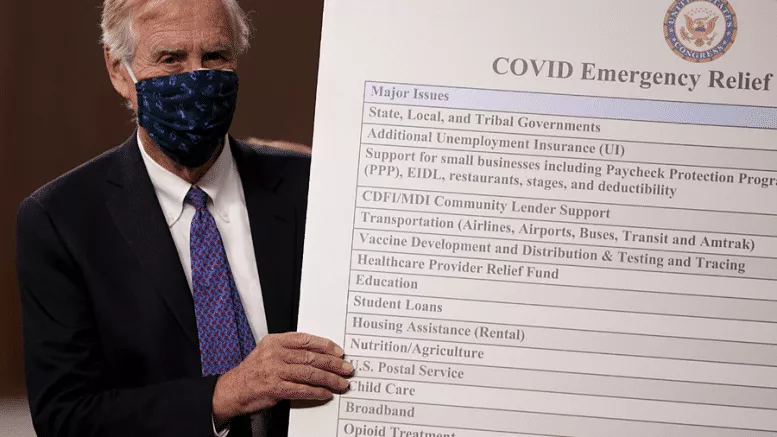- A $908 billion Covid relief proposal issued by a bipartisan group of senators would pay a $300-a-week supplement to unemployment benefits for 16 weeks. It wouldn’t be retroactive.
- The Bipartisan Emergency COVID Relief Act of 2020 would also extend the duration of benefits for millions of self-employed, gig and other workers for 16 weeks.
- A $916 billion White House proposal issued Tuesday by Treasury Secretary Steven Mnuchin threatened to derail bipartisan negotiations on a relief package.
A bipartisan Senate relief package would pay a $300 weekly boost to unemployment benefits for 16 weeks and extend jobless aid for millions of workers set to lose assistance at year’s end, according to a summary of the legislation issued Wednesday.
The $908 billion bill, the Bipartisan Emergency COVID Relief Act of 2020, would not issue benefits retroactively, as some had hoped.
$300 unemployment boost
States paid around $320 a week to the average worker in October, absent that federal enhancement, according to the Labor Department. However, some states pay much less — as little as $5 a week.
nother federal stipend would follow the expiration of a $600 weekly boost offered by the $2.2 trillion CARES Act and a subsequent $300-a-week supplement issued over the summer by the White House.
Self-employed and gig workers
The bipartisan Senate proposal would also continue paying benefits through “all pandemic unemployment insurance programs” that are scheduled to expire the last weekend in December. That aid would also last for 16 weeks.
Among the programs are Pandemic Unemployment Assistance for self-employed, gig, freelance and other workers ineligible for traditional state unemployment insurance, and Pandemic Emergency Unemployment Compensation, which offers up to 13 extra weeks of state benefits.
Together, the two programs pay assistance to more than 13 million people — amounting to two-thirds of all unemployed workers, according to Labor Department figures.
White House proposal
Momentum has built in recent days for the bipartisan Senate framework, issued last week by a moderate group of senators.
The bill would provide $180 billion in funding for additional unemployment benefits, and includes money for other areas like small business relief, education funding, student loans, rental assistance and child care, according to the summary document. Lawmakers are still hashing out details on aid for state and local governments and liability protections for businesses from Covid-related lawsuits.
However, the White House threatened to throw cold water on negotiators’ progress.
Treasury Secretary Steven Mnuchin made a $916 billion offer to House Speaker Nancy Pelosi, D-Calif., on Tuesday, which reportedly didn’t include a weekly enhancement to benefits.
The offer would instead issue a one-time $600 stimulus check to Americans and would extend expiring federal unemployment programs, according to reports.
Mnuchin and White House chief of staff Mark Meadows reviewed the $916 billion proposal with President Donald Trump, Senate Majority Leader Mitch McConnell, R-Ky., and House Minority Leader Kevin McCarthy, R-Calif., the Treasury secretary said Tuesday in a statement.
“The President’s proposal starts by cutting the unemployment insurance proposal being discussed by bipartisan Members of the House and Senate from $180 billion to $40 billion. That is unacceptable,” Pelosi and Senate Minority Leader Chuck Schumer, D-N.Y., said Tuesday in a joint statement.
The Treasury Department and White House didn’t return a request for comment.
Senators involved in the bipartisan negotiations include: Bill Cassidy, R-La.; Susan Collins, R-Maine; Maggie Hassan, D-N.H.; Angus King, I-Maine; Joe Manchin, D-W.Va.; Lisa Murkowski, R-Alaska.; Mitt Romney, R-Utah; Jeanne Shaheen, D-N.H.; and Mark Warner, D-Va.

